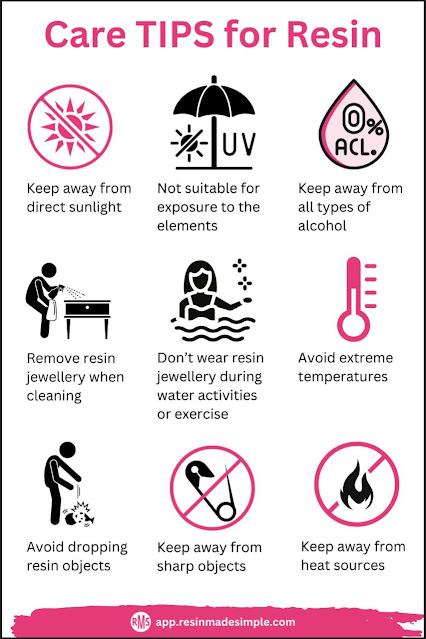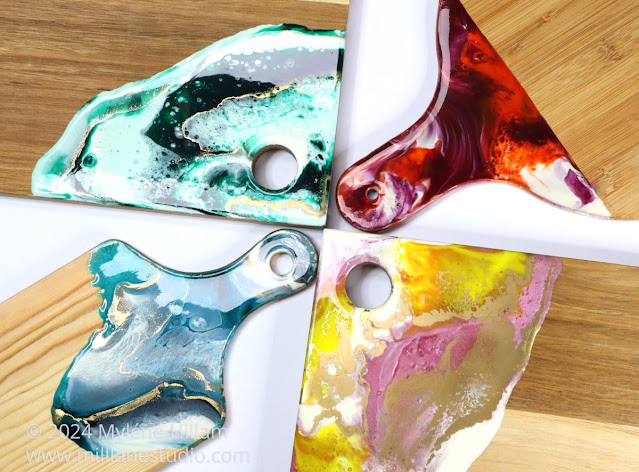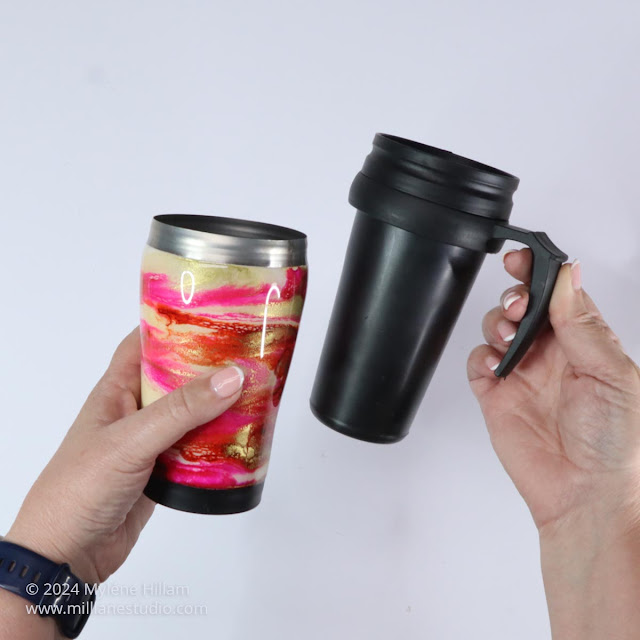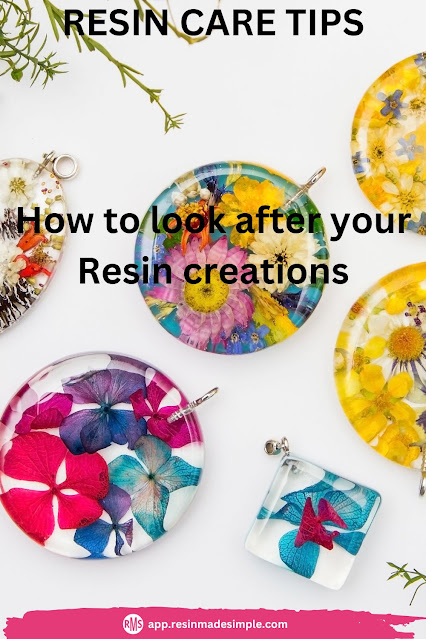Resin is a durable and versatile plastic that can be made into so many
wonderful items. With care, you will get many years of enjoyment from your
pieces. But there are some things you should and shouldn't do with your resin
pieces to make sure they stay looking their best.
If you want to avoid yellowing, scratches, chips, cracking and deterioration,
then you need to know the DOs and DON'Ts of resin care.
Here are the general rules and guidelines for caring for your resin creations:
First, let's look at the things that can damage/ruin your resin pieces.
- Sunlight. The sun and UV rays accelerate yellowing. Epoxy breaks down when exposed to sunlight and UV rays. There's no such thing as sunscreen for resin, so keep your resin pieces away from direct sunlight.
- Exposure to the elements. Epoxy resin doesn't cope with exposure to the elements, so it's not suitable for being left outside for extended periods of time. If you use your resin items outside, bring them in again to keep them protected.
- Alcohol. Keep your resin pieces away from all forms of alcohol (alcoholic beverages, denatured alcohol, and isopropyl alcohol, to name a few). Alcohol dulls the resin, so it loses its glossy finish. Some resins even become a little sticky and soft when alcohol gets on them so lint and other stray bits stick to it.
- Cleaning products, hand sanitiser, perfumes, skin lotions and sunscreens. Remove resin jewellery when cleaning (housework, dishwashing, gardening, etc) so it doesn't come into direct contact with any of these products
- Chlorinated or salt water and perspiration. Don't wear resin jewellery during water activities or when exercising.
- Temperature extremes. Keep the room temperature where your resin pieces are (whether artworks or decor pieces) at an even temperature and avoid extreme temperatures. Extreme cold can make your pieces brittle and extreme heat can soften the resin.
-
Dropping from a height. Avoid dropping your resin items, as the edges can chip. Resin generally doesn't break (unless it's a thin piece), but it can be damaged.
-
Sharp objects. Avoid anything sharp as it will scratch the resin. Simple everyday items like safety pins, knives, etc can easily permanently mark the resin.
-
Naked flames. Keep flames away from resin. Candle heat can melt and soften resin, especially in a semi-enclosed design that contains heat within the candle holder. My preference is to use flickering flameless candles. The "flame" actually moves, so they look incredibly realistic.
Pin These TIPS!
Download the FREE Care
Tips for Resin sheet
and keep it handy.
Following these general guidelines is a good starting place. If you want to
know how to look after your individual pieces, keep reading... and get the
FREE bonus download at the bottom of the post.
Resin Coaster Care
Resin coasters fall into two categories and they have slightly different care
needs:
- Resin poured over a substrate, like wood or tile
- Resin poured into a mould.
When you're making coasters, keep in mind that most epoxy resins can't handle high temperatures so they can be damaged if you use them for hot drinks. Here's some tips to help you get the most from your handmade resin coasters:
- Hot mugs can leave a permanent ring on softer types of epoxy. The heat from the base of the cup softens and dents the resin.
- If your coasters are made with a softer resin, reserve them for cold drinks only.
- Want to use your coasters with hot drinks? Then use a resin that can cope with the heat from a hot cuppa, like this one.
- Or spray the finished coaster with 3-4 coats of very high temperature clear automotive spray.
Cleaning Your Coasters
If your resin coasters have a wooden base that's coated with resin:
- Wipe the resin over with a soft, damp cloth and regular dishwashing detergent.
- Don't submerge in water or the wood will swell.
Coasters made with casting resin in a mould:
- These can be washed in warm, soapy water and wiped with a clean, soft cloth.
- Don't place them in a dishwasher.
- Avoid scourers (even nylon ones) as these will scratch the glossy finish.
Most epoxies are NOT DISHWASHER SAFE.
Unless your resin specifically says it's dishwasher safe, don't place resin
coasters, bowls or cups in the dishwasher.
How to Care For Resin Charcuterie Boards
These are also known as Serving Boards, Cheese Boards, Cutting Boards & Chopping Boards. If you have any of these, follow the care instructions below:
- Wipe the resin with a damp cloth and dry with a soft cloth after each use.
- Handwash only. Do not immerse in water.
- Neither the resin nor the wood are suitable for the dishwasher.
- Maintain the wood by occasionally seasoning the board with FOOD-GRADE mineral oil. The oil prevents liquids from penetrating the wood and protects it from drying out and splitting.
- Avoid placing acidic foods (cocktail onions, pickles, etc.) directly on the resin surface. Instead, place these in ramekins or small serving dishes. Likewise, for hot foods, keep them off the resin part of the board.
- Do not cut on the resin surface.
Caring for Resin Tumblers, Plates, Bowls and Tiered Cake Plates
Any resin items used for food or drink must be made from epoxy resin that
complies with the FDA regulations for surfaces that come into contact with
food. The resin needs to be fully cured before use, so check the instructions
in your resin kit (or the Safety Data Sheet and technical bulletin) to find
out how long it needs to be cured before using it.
The DOs and DON'Ts
- Avoid hot foods or liquids from coming into direct contact with resin.
- It might seem contradictory to say this but resin shot glasses shouldn't be used with alcohol. The alcohol breaks down the resin, making the surface sticky and dull.
- Knives will permanently damage resin, so avoid cutting on resin plates and bowls.
- Don't place resin items in the dishwasher. Dishwasher tablets have strong chemicals that can break down the resin
Expert Tip: Doilies add a feminine touch to cake platters—perfect for
afternoon tea! They also add an extra layer of protection between food and the resin surface.
How to Clean Resin Homewares
A wipe-over with a soft cloth and soapy water is usually all that's required
to keep resin homewares looking good.
To wash them, use dishwashing liquid and a sponge or cloth. Avoid all types of
scourers, even nylon scourers, which could scratch the surface. Dry them off
with a soft tea towel.
If your resin travel mug has an inner and an outer cup, you can separate these
and wash the inner plastic cup in the dishwasher. Wipe the outer resin cup
with a sponge and soapy water.
For items that will be on display when not in use, like pretty tiered cake
plates, keep them out of direct sunlight to delay yellowing.
Resin Keyrings
The nature of a resin keyring means it will inevitably get some scratches from
coming into contact with keys all the time. There's not much you can do to
avoid that. Here are some other ways you can care for resin keychains and
shakers
Care Tips for Resin Keychains
- Keep the keychain out of the sun
- Don't leave your keychain in a hot car
- Avoid handling the keychain if you've just sanitised your hands (sanitisers contain alcohol). Wait for it to evaporate first.
- Keep your resin keychain fingerprint-free by not touching the resin if you've just moisturised your hands.
- Avoid overloading your keychain with keys so the eyelet doesn't get stressed from the weight of the keys.
Resin Jewellery Care
Like any jewellery, resin jewellery needs care to keep it looking its best. It
will be exposed to perfumes, hairspray, body oils, and perspiration. Look
after your resin jewellery by storing it in a jewellery box when it's not
being worn so that it's not unnecessarily exposed to UV light. Here's some
other things to look out for:
- Remove your resin jewellery when sleeping
- Remove it when bathing, swimming, and exercising. Resin is water resistant, so it's OK if it gets some water on it. But pool chemicals and salt water can affect and discolour it.
- Avoid handling it until after moisturisers and lotions have soaked into your skin
- Avoid contact with perfume and hairspray
- Avoid sharp objects that can scratch the surface
- Avoid exposure to UV light sources (the sun, nail lamps, etc)
Care Tips for Resin Jewellery
- Wipe over your resin jewellery with a soft, dry cloth to remove fingerprints and body oils.
- Store your resin jewellery in a jewellery box, a jewellery pouch or on a jewellery tree where it won't be scratched by other jewellery.
- Keep it out of sunlight to preserve its original colour.
How to Clean and Care for Epoxy Resin Artwork
If you're the proud owner of a gorgeous resin art piece, you want to protect
your investment. Here's some tips to help keep it looking its best:
- Hang securely so it doesn't fall. It might sound obvious, but your resin painting is probably heavy, so use a fastening method that will support the weight of your painting.
- If your artwork is textured or 3D like a Geode painting, use a paintbrush or soft toothbrush to flick off any dust that's collected among the crystals. My favourite trick is to use a can of compressed air to blow the dust out of the crevices.
- Another trick you can use is silly putty to grab the dust from textured areas
- Avoid alcohol-based cleaners. These can cause dull spots on the resin
- Lightly wipe away any marks with a soft cloth, like a lens cloth.
- Keep out of direct sunlight to avoid premature yellowing of the resin
- Avoid temperature fluctuations
Resin Care FAQs and Troubleshooting
Q. Can resin items be immersed in water?
A. Epoxy resin is water resistant, but it's not waterproof. It
won't do any damage if you get caught in the rain. But it's best not to leave
it submerged in water.
Q. How do you remove light scratches and bring back the shine on resin?
A. Use a flanelette cloth and Micro-Gloss or
Flitz.
This will remove light scratches and make the resin glossy again. For deeper
scratches, sand the resin with micro-polishing pads,
like these. Start with the coarsest grade and work your way up to the finest
grade.
Q. I left my resin piece in a hot car and it warped. Can I do anything to
make it flat again?
A. Place it on a flat surface and let it return to room
temperature. This is often all that's needed to flatten it again.
Q. The resin has cracked on my single-walled stainless steel tumbler. Why
did this happen?
A. Stainless steel expands at a different rate to resin, so
when a hot liquid is placed inside a single-walled stainless steel tumbler,
it expands, causing the resin to crack. Only use cold liquids inside
single-walled tumblers. If you want to fill your resin tumblers with hot
drinks, they must be double-walled.
If you've got any other care-related questions, leave them in the
comments.
Pin This!

Subscribe to my email list and learn how to resin like an expert.








